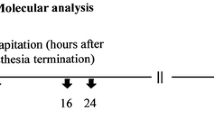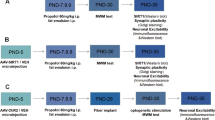Abstract
Rationale
Animal studies have shown that early postnatal propofol administration is involved in neurobehavioral alterations in adults. However, the underlying mechanism is not clear.
Methods
We used c-Fos immunohistochemistry to identify activated neurons in brain regions of neonatal mice under propofol exposure and performed behavioral tests to observe the long-term consequences.
Results
Exposure to propofol (30g or 60 mg/kg) on P7 produced significant c-Fos expression in the deep layers of the piriform cortex on P8. Double immunofluorescence of c-Fos with interneuron markers in the piriform cortex revealed that c-Fos was specifically induced in calbindin (CB)-positive interneurons. Repeated propofol exposure from P7 to P9 induced behavioral deficits in adult mice, such as olfactory function deficit in a buried food test, decreased sociability in a three-chambered choice task, and impaired recognitive ability of learning and memory in novel object recognition tests. However, locomotor activity in the open-field test was not generally affected. Propofol treatment also significantly decreased the number of CB-positive interneurons in the piriform cortex of mice on P21 and adulthood.
Conclusions
These results suggest that CB-positive interneurons in the piriform cortex are vulnerable to propofol exposure during the neonatal period, and these neurons are involved in the damage effects of propofol on behavior changes. These data provide a new target of propofol neurotoxicity and may elucidate the mechanism of neurobehavioral deficits in adulthood.









Similar content being viewed by others
References
Albers MW, Tabert MH, Devanand DP (2006) Olfactory dysfunction as a predictor of neurodegenerative disease. Current neurology and neuroscience reports 6:379–386
Armstrong C, Wang J, Yeun Lee S, Broderick J, Bezaire MJ, Lee SH, Soltesz I (2016) Target-selectivity of parvalbumin-positive interneurons in layer II of medial entorhinal cortex in normal and epileptic animals. Hippocampus 26:779–793. https://doi.org/10.1002/hipo.22559
Bevins RA, Besheer J (2006) Object recognition in rats and mice: a one-trial non-matching-to-sample learning task to study 'recognition memory'. Nat Protoc 1:1306–1311. https://doi.org/10.1038/nprot.2006.205
Canugovi C, Misiak M, Scheibye-Knudsen M, Croteau DL, Mattson MP, Bohr VA (2015) Loss of NEIL1 causes defects in olfactory function in mice. Neurobiol Aging 36:1007–1012. https://doi.org/10.1016/j.neurobiolaging.2014.09.026
Cattano D, Young C, Straiko MM, Olney JW (2008) Subanesthetic doses of propofol induce neuroapoptosis in the infant mouse brain. Anesth Analg 106:1712–1714. https://doi.org/10.1213/ane.0b013e318172ba0a
Cohen BM, Cherkerzian S, Ma J, Ye N, Wager C, Lange N (2003) Cells in midline thalamus, central amygdala, and nucleus accumbens responding specifically to antipsychotic drugs. Psychopharmacology 167:403–410. https://doi.org/10.1007/s00213-003-1423-0
Cunningham M, Cho JH, Leung A, Savvidis G, Ahn S, Moon M, Lee PKJ, Han JJ, Azimi N, Kim KS, Bolshakov VY, Chung S (2014) hPSC-derived maturing GABAergic interneurons ameliorate seizures and abnormal behavior in epileptic mice. Cell Stem Cell 15:559–573. https://doi.org/10.1016/j.stem.2014.10.006
Dalla Massara L, Osuru HP, Oklopcic A, Milanovic D, Joksimovic SM, Caputo V, DiGruccio MR, Ori C, Wang G, Todorovic SM, Jevtovic-Todorovic V (2016) General anesthesia causes epigenetic histone modulation of c-Fos and brain-derived neurotrophic factor. Target genes important for neuronal development in the immature rat hippocampus. Anesthesiology 124:1311–1327. https://doi.org/10.1097/aln.0000000000001111
Deng M, Hofacer RD, Jiang C, Joseph B, Hughes EA, Jia B, Danzer SC, Loepke AW (2014) Brain regional vulnerability to anaesthesia-induced neuroapoptosis shifts with age at exposure and extends into adulthood for some regions. Br J Anaesth 113:443–451. https://doi.org/10.1093/bja/aet469
DiMaggio C, Sun LS, Kakavouli A, Byrne MW, Li G (2009) A retrospective cohort study of the association of anesthesia and hernia repair durgery with behavioral and developmental disorders in young children. J Neurosurg Anesthesiol 21:286–291. https://doi.org/10.1097/ANA.0b013e3181a71f11
Doty RL (2012) Olfactory dysfunction in Parkinson disease. Nat Rev Neurol 8:329–339. https://doi.org/10.1038/nrneurol.2012.80
Gavrilovici C, D'Alfonso S, Poulter MO (2010) Diverse interneuron populations have highly specific interconnectivity in the rat piriform cortex. J Comp Neurol 518:1570–1588. https://doi.org/10.1002/cne.22291
Gonzales EL et al (2015) Repeated neonatal propofol administration induces sex-dependent long-term impairments on spatial and recognition memory in rats. Biomol Ther 23:251–260. https://doi.org/10.4062/biomolther.2014.120
Hashemi M, Hutt A, Sleigh J (2015) How the cortico-thalamic feedback affects the EEG power spectrum over frontal and occipital regions during propofol-induced sedation. J Comput Neurosci 39:155–179. https://doi.org/10.1007/s10827-015-0569-1
Huang J, Jing S, Chen X, Bao X, du Z, Li H, Yang T, Fan X (2015) Propofol administration during early postnatal life suppresses hippocampal neurogenesis. Mol Neurobiol 53:1031–1044. https://doi.org/10.1007/s12035-014-9052-7
Illig KR (2007) Developmental changes in odor-evoked activity in rat piriform cortex. Neuroscience 145:370–376. https://doi.org/10.1016/j.neuroscience.2006.11.049
Ing CH, DiMaggio CJ, Malacova E, Whitehouse AJ, Hegarty MK, Feng T, Brady JE, von Ungern-Sternberg BS, Davidson AJ, Wall MM, Wood AJJ, Li G, Sun LS (2014) Comparative analysis of outcome measures used in examining neurodevelopmental effects of early childhood anesthesia exposure. Anesthesiology 120:1319–1332. https://doi.org/10.1097/aln.0000000000000248
Insausti R, Marcos P, Arroyo-Jimenez MM, Blaizot X, Martinez-Marcos A (2002) Comparative aspects of the olfactory portion of the entorhinal cortex and its projection to the hippocampus in rodents, nonhuman primates, and the human brain. Brain Res Bull 57:557–560
Irifune M, Takarada T, Shimizu Y, Endo C, Katayama S, Dohi T, Kawahara aM (2003) Propofol-induced anesthesia in mice is mediated by γ-aminobutyric acid-a and excitatory amino acid receptors. Anesth Analg 97:424–429. https://doi.org/10.1213/01.ane.0000059742.62646.40
Jevtovic-Todorovic V, Hartman RE, Izumi Y, Benshoff ND, Dikranian K, Zorumski CF, Olney JW, Wozniak DF (2003) Early exposure to common anesthetic agents causes widespread neurodegeneration in the developing rat brain and persistent learning deficits. J Neurosci 23:876–882
Kajiwara R, Takashima I (2015) Early exposure to urethane anesthesia: effects on neuronal activity in the piriform cortex of the developing brain. Neurosci Lett 600:121–126. https://doi.org/10.1016/j.neulet.2015.06.012
Kalkman CJ, Peelen L, Moons KG, Veenhuizen M, Bruens M, Sinnema G, de Jong TP (2009) Behavior and development in children and age at the time of first anesthetic exposure. Anesthesiology 110:805–812. https://doi.org/10.1097/ALN.0b013e31819c7124
Karen T, Schlager GW, Bendix I, Sifringer M, Herrmann R, Pantazis C, Enot D, Keller M, Kerner T, Felderhoff-Mueser U (2013) Effect of propofol in the immature rat brain on short- and long-term neurodevelopmental outcome. PLoS One 8:e64480. https://doi.org/10.1371/journal.pone.0064480
Kim JE, Kim YJ, Kim JY, Kang TC (2014) PARP1 activation/expression modulates regional-specific neuronal and glial responses to seizure in a hemodynamic-independent manner. Cell Death Dis 5:e1362. https://doi.org/10.1038/cddis.2014.331
Kozinn J, Mao L, Arora A, Yang L, Fibuch EE, Wang JQ (2006) Inhibition of glutamatergic activation of extracellular signal-regulated protein kinases in hippocampal neurons by the intravenous anesthetic propofol. Anesthesiology 105:1182–1191
Leger M, Quiedeville A, Bouet V, Haelewyn B, Boulouard M, Schumann-Bard P, Freret T (2013) Object recognition test in mice. Nat Protoc 8:2531–2537. https://doi.org/10.1038/nprot.2013.155
Lietzau G, Nystrom T, Ostenson CG, Darsalia V, Patrone C (2016) Type 2 diabetes-induced neuronal pathology in the piriform cortex of the rat is reversed by the GLP-1 receptor agonist exendin-4. Oncotarget 7:5865–5876. https://doi.org/10.18632/oncotarget.6823
Lin DY, Zhang SZ, Block E, Katz LC (2005) Encoding social signals in the mouse main olfactory bulb. Nature 434:470–477. https://doi.org/10.1038/nature03414
Linster C, Hasselmo ME (2001) Neuromodulation and the functional dynamics of piriform cortex. Chem Senses 26:585–594
Loscher W, Ebert U (1996) The role of the piriform cortex in kindling. Prog Neurobiol 50:427–481
Luna VM, Schoppa NE (2008) GABAergic circuits control input-spike coupling in the piriform cortex. J Neurosci 28:8851–8859. https://doi.org/10.1523/jneurosci.2385-08.2008
Mintz CD, Barrett KM, Smith SC, Benson DL, Harrison NL (2013) Anesthetics interfere with axon guidance in developing mouse neocortical neurons in vitro via a gamma-aminobutyric acid type A receptor mechanism. Anesthesiology 118:825–833. https://doi.org/10.1097/ALN.0b013e318287b850
Moy SS, Nadler JJ, Perez A, Barbaro RP, Johns JM, Magnuson TR, Piven J, Crawley JN (2004) Sociability and preference for social novelty in five inbred strains: an approach to assess autistic-like behavior in mice. Genes Brain Behav 3:287–302. https://doi.org/10.1111/j.1601-1848.2004.00076.x
Reiner GN, Perillo MA, Garcia DA (2013) Effects of propofol and other GABAergic phenols on membrane molecular organization. Colloids Surf B: Biointerfaces 101:61–67. https://doi.org/10.1016/j.colsurfb.2012.06.004
Saiz-Sanchez D, De la Rosa-Prieto C, Ubeda-Banon I, Martinez-Marcos A (2015) Interneurons, tau and amyloid-beta in the piriform cortex in Alzheimer's disease. Brain Struct Funct 220:2011–2025. https://doi.org/10.1007/s00429-014-0771-3
Sarma AA, Richard MB, Greer CA (2011) Developmental dynamics of piriform cortex. Cereb Cortex 21:1231–1245. https://doi.org/10.1093/cercor/bhq199
Satomoto M, Satoh Y, Terui K, Miyao H, Takishima K, Ito M, Imaki J (2009) Neonatal exposure to sevoflurane induces abnormal social behaviors and deficits in fear conditioning in mice. Anesthesiology 110:628–637. https://doi.org/10.1097/ALN.0b013e3181974fa2
Schwob JE, Haberly LB, Price JL (1984) The development of physiological responses of the piriform cortex in rats to stimulation of the lateral olfactory tract. J Comp Neurol 223:223–237. https://doi.org/10.1002/cne.902230206
Sprung J, Flick RP, Katusic SK, Colligan RC, Barbaresi WJ, Bojanić K, Welch TL, Olson MD, Hanson AC, Schroeder DR, Wilder RT, Warner DO (2012) Attention-deficit/hyperactivity disorder after early exposure to procedures requiring general anesthesia. Mayo Clin Proc 87:120–129. https://doi.org/10.1016/j.mayocp.2011.11.008
Sumner BE, Cruise LA, Slattery DA, Hill DR, Shahid M, Henry B (2004) Testing the validity of c-fos expression profiling to aid the therapeutic classification of psychoactive drugs. Psychopharmacology 171:306–321. https://doi.org/10.1007/s00213-003-1579-7
Suzuki N, Bekkers JM (2006) Neural coding by two classes of principal cells in the mouse piriform cortex. J Neurosci 26:11938–11947. https://doi.org/10.1523/JNEUROSCI.3473-06.2006
Thompson KW, Wasterlain CG (2001) Urethane anesthesia produces selective damage in the piriform cortex of the developing brain. Brain Res Dev Brain Res 130:167–171
Tu S, Wang X, Yang F, Chen B, Wu S, He W, Yuan X, Zhang H, Chen P, Wei G (2011) Propofol induces neuronal apoptosis in infant rat brain under hypoxic conditions. Brain Res Bull 86:29–35. https://doi.org/10.1016/j.brainresbull.2011.06.017
Vaughan DN, Jackson GD (2014) The piriform cortex and human focal epilepsy. Front Neurol 5:259. https://doi.org/10.3389/fneur.2014.00259
Walton RM (2012) Postnatal neurogenesis: of mice, men, and macaques. Vet Pathol 49:155–165. https://doi.org/10.1177/0300985811414035
Wang H, Liu S, Wang H, Wang G, Zhu A (2015) The effect of propofol postconditioning on the expression of K(+)-Cl(-)-co-transporter 2 in GABAergic inhibitory interneurons of acute ischemia/reperfusion injury rats. Brain Res 1597:210–219. https://doi.org/10.1016/j.brainres.2014.11.036
Wilder RT, Flick RP, Sprung J, Katusic SK, Barbaresi WJ, Mickelson C, Gleich SJ, Schroeder DR, Weaver AL, Warner DO (2009) Early exposure to anesthesia and learning disabilities in a population-based birth cohort. Anesthesiology 110:796–804. https://doi.org/10.1097/01.anes.0000344728.34332.5d
Witter MP, Amaral DG (1991) Entorhinal cortex of the monkey: V. projections to the dentate gyrus, hippocampus, and subicular complex. J Comp Neurol 307:437–459. https://doi.org/10.1002/cne.903070308
Xu P, Xu H, Tang X, Xu L, Wang Y, Guo L, Yang Z, Xing Y, Wu Y, Warner M, Gustafsson JA, Fan X (2014) Liver X receptor beta is essential for the differentiation of radial glial cells to oligodendrocytes in the dorsal cortex. Mol Psychiatry 19:947–957. https://doi.org/10.1038/mp.2014.60
Xu L, Tang X, Wang Y, Xu H, Fan X (2015) Radial glia, the keystone of the development of the hippocampal dentate gyrus. Mol Neurobiol 51:131–141. https://doi.org/10.1007/s12035-014-8692-y
Yang M, Crawley JN (2009) Simple behavioral assessment of mouse olfaction. Current protocols in neuroscience/editorial board Jacqueline N Crawley [et al] Chapter 8:Unit 8:24. https://doi.org/10.1002/0471142301.ns0824s48
Yon JH, Daniel-Johnson J, Carter LB, Jevtovic-Todorovic V (2005) Anesthesia induces neuronal cell death in the developing rat brain via the intrinsic and extrinsic apoptotic pathways. Neuroscience 135:815–827. https://doi.org/10.1016/j.neuroscience.2005.03.064
Yu D, Jiang Y, Gao J, Liu B, Chen P (2013) Repeated exposure to propofol potentiates neuroapoptosis and long-term behavioral deficits in neonatal rats. Neurosci Lett 534:41–46. https://doi.org/10.1016/j.neulet.2012.12.033
Zhu C, Gao J, Karlsson N, Li Q, Zhang Y, Huang Z, Li H, Kuhn HG, Blomgren K (2010) Isoflurane anesthesia induced persistent, progressive memory impairment, caused a loss of neural stem cells, and reduced neurogenesis in young, but not adult, rodents. Journal of cerebral blood flow and metabolism: official journal of the International Society of Cerebral Blood Flow and Metabolism 30:1017–1030. https://doi.org/10.1038/jcbfm.2009.274
Zou X, Liu F, Zhang X, Patterson TA, Callicott R, Liu S, Hanig JP, Paule MG, Slikker W Jr, Wang C (2011) Inhalation anesthetic-induced neuronal damage in the developing rhesus monkey. Neurotoxicol Teratol 33:592–597. https://doi.org/10.1016/j.ntt.2011.06.003
Funding
This study was supported by the National Natural Science Foundation of China (No. 81371197).
Author information
Authors and Affiliations
Corresponding authors
Ethics declarations
Conflict of interest
The authors declare no potential conflicts of interest with respect to the research, authorship, and/or publication of this article.
Rights and permissions
About this article
Cite this article
Yu, D., Xiao, R., Huang, J. et al. Neonatal exposure to propofol affects interneuron development in the piriform cortex and causes neurobehavioral deficits in adult mice. Psychopharmacology 236, 657–670 (2019). https://doi.org/10.1007/s00213-018-5092-4
Received:
Accepted:
Published:
Issue Date:
DOI: https://doi.org/10.1007/s00213-018-5092-4




